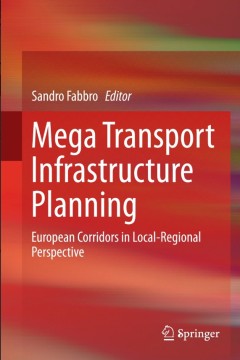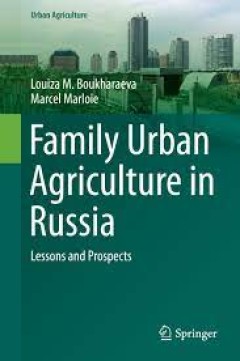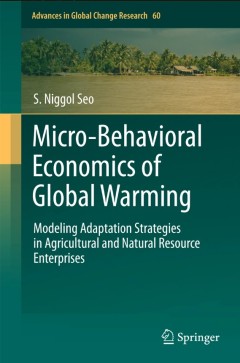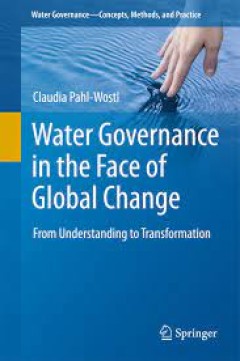Filter by

Tourism and Global Environmental Change Ecological, Economic, Social and Pol…
This fascinating book is the first comprehensive analysis of the economic, social and political interrelationships between tourism and global environmental change: one of the most significant issues facing humankind today. Its contributors argue that the impacts of these changes are potentially extremely serious both for the tourism industry, and for the communities dependent upon it. Integr…
- Edition
- -
- ISBN/ISSN
- 9780203011911
- Collation
- -
- Series Title
- -
- Call Number
- -

Integrating Sustainability Thinking in Science and Engineering Curricula Inn…
Including considerations of sustainability in universities’ activities has long since become mainstream. However, there is still much to be done with regard to the full integration of sustainability thinking into science and engineering curricula. Among the problems that hinder progress in this field, the lack of sound information on how to actually implement it is prominent. Created in order…
- Edition
- -
- ISBN/ISSN
- 978-3-319-09474-8
- Collation
- -
- Series Title
- -
- Call Number
- -

Efficiency of Manufacturing Processes Energy and Ecological Perspectives
This monograph presents a reliable methodology for characterising the energy and eco-efficiency of unit manufacturing processes. The Specific Energy Consumption, SEC, will be identified as the key indicator for the energy efficiency of unit processes. An empirical approach will be validated on different machine tools and manufacturing processes to depict the relationship between process paramet…
- Edition
- -
- ISBN/ISSN
- 978-3-319-17365-8
- Collation
- -
- Series Title
- -
- Call Number
- -

The New Arctic
“The New Arctic” highlights how, and in what parts, the natural and political system is being transformed. We’re talking about a region where demography, culture, and political and economic systems are increasingly diverse, although many common interests and aspects remain; and with the new Arctic now firmly placed in a global context. Settlements range from small, predominantly indigenou…
- Edition
- -
- ISBN/ISSN
- 978-3-319-17602-4
- Collation
- XXII, 352
- Series Title
- -
- Call Number
- -

ZEMCH: Toward the Delivery of Zero Energy Mass Custom Homes
In this book, leading international experts explore the emerging concept of the zero energy mass custom home (ZEMCH) – designed to meet the need for social, economic, and environmental sustainability – and provide all of the knowledge required for the delivery of zero energy mass customized housing and community developments in developed and developing countries. The coverage is wide rangin…
- Edition
- -
- ISBN/ISSN
- 978-3-319-31967-4
- Collation
- -
- Series Title
- -
- Call Number
- -

Mega Transport Infrastructure Planning
Based on the work of Poly5, or the Mediterranean Corridor, mega-transport infrastructure project, this ground-breaking reference explains how and why traditional top-down government-defined transport planning policies are failing, due to their tendency to eschew acknowledgement of profoundly multifarious local and regional issues. The authors use cognitive reports from the Mediterranean Corrido…
- Edition
- 1
- ISBN/ISSN
- 978-3-319-16395-6
- Collation
- X, 264
- Series Title
- -
- Call Number
- -

Family Urban Agriculture in Russia Lessons and Prospects
The book results from research carried out by the authors since 1999 on urban gardening collectives in Russia, then from the extension of this research towards collective urban gardening in France, with some investigations in other European Union Member States and Brazil. This research was carried out within the framework of Kazan University (currently, the Institute of Administration and Terri…
- Edition
- -
- ISBN/ISSN
- 978-3-319-11614-3
- Collation
- XVII, 215
- Series Title
- -
- Call Number
- -

Micro-Behavioral Economics of Global Warming
This book presents a foundation for studying the micro-behavioral economics of global warming. The author develops an empirical model, named the Geographically-scaled Micro econometric model of Adapting Portfolios (G-MAP) in response to climatic changes and risks. The G-MAP model is applied to observed decisions of agricultural and natural resource enterprises in Sub-Saharan Africa and South Am…
- Edition
- 1
- ISBN/ISSN
- 978-3-319-15945-4
- Collation
- IX, 102
- Series Title
- Advances in Global Change Research
- Call Number
- -

Water Governance in the Face of Global Change From Understanding to Transfor…
This book offers the first comprehensive treatment of multi-level water governance, developing a conceptual and analytical framework that captures the complexity of real water governance systems while also introducing different approaches to comparative analysis. Applications illustrate how the ostensibly conflicting goals of deriving general principles and of taking context-specific factors in…
- Edition
- -
- ISBN/ISSN
- 978-3-319-21855-7
- Collation
- XV, 287
- Series Title
- -
- Call Number
- -

Urban Development Challenges, Risks and Resilience in Asian Mega Cities
In this book, an interdisciplinary research group of faculty members, researchers, professionals, and planners contributed to an understanding of the dynamics and dimensions of emerging challenges and risks in megacities in the rapidly changing urban environments in Asia and examined emerging resilience themes from the point of view of sustainability and public policy. The world’s urban popul…
- Edition
- -
- ISBN/ISSN
- 978-4-431-55043-3
- Collation
- 66 b/w illustrations, 85 illustrations in colour
- Series Title
- -
- Call Number
- -
 Computer Science, Information & General Works
Computer Science, Information & General Works  Philosophy & Psychology
Philosophy & Psychology  Religion
Religion  Social Sciences
Social Sciences  Language
Language  Pure Science
Pure Science  Applied Sciences
Applied Sciences  Art & Recreation
Art & Recreation  Literature
Literature  History & Geography
History & Geography